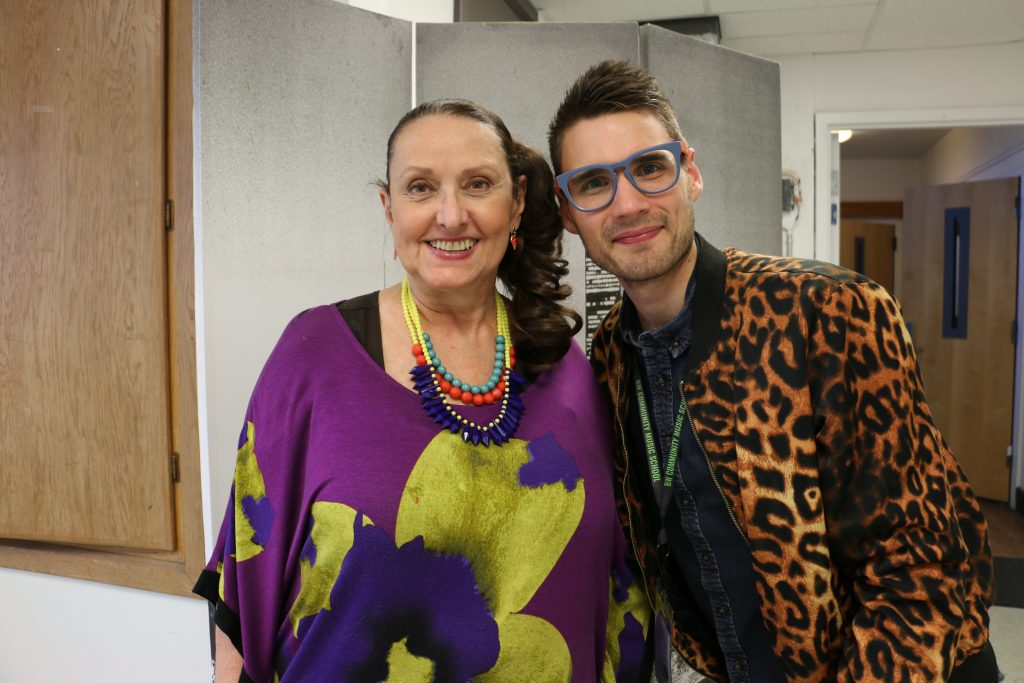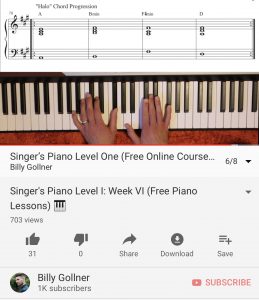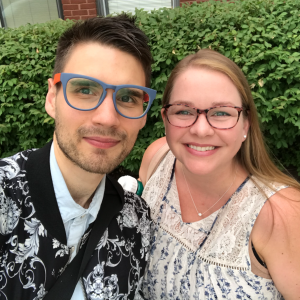 You have recently launched a Free Online Piano Course specifically designed for singers, what can you tell us about the course? How did it come about?
You have recently launched a Free Online Piano Course specifically designed for singers, what can you tell us about the course? How did it come about?
 I am the middle of five kids; I don’t come from a family that had extra money kicking around for piano lessons. When I started teaching, I realized there were many students who shared a similar story, they loved singing, they loved music but financial resources prevented them from developing some areas of their musicianship that would help them as artists and singers.
I am the middle of five kids; I don’t come from a family that had extra money kicking around for piano lessons. When I started teaching, I realized there were many students who shared a similar story, they loved singing, they loved music but financial resources prevented them from developing some areas of their musicianship that would help them as artists and singers.
So, I developed Singer’s Piano as a free online course as are resource for adults and young people who are driven, self-motivated, and talented to build the skills they need without breaking the bank. I wanted to create a resource that eliminated the wealth-based barrier to learning the essentials of piano.
Level One is a 12-week course. Each week students learn scales, chords, reading music, how to accompanying themselves, and song writing essentials. By the end of the 12 weeks, they’ll have explored all 12 keys, and learned the basics of what they need to know to read music and sing and play at the same time. If you’re interested in checking out Singer’s Piano, click here.
Your voice studio is very unique in that the majority of students take lessons online. What advice do you have for teachers wanting to teach voice lessons online?
 I consider myself very lucky to work with many unique and creative artists all over the world. When I moved to the United Kingdom from Vancouver, Canada two years ago, I suddenly found that my private studio was 100% via online lessons. Now that I have returned to Vancouver, the rate is about 50-50 for online vs. in-person lessons.
I consider myself very lucky to work with many unique and creative artists all over the world. When I moved to the United Kingdom from Vancouver, Canada two years ago, I suddenly found that my private studio was 100% via online lessons. Now that I have returned to Vancouver, the rate is about 50-50 for online vs. in-person lessons.
The most important considerations for any teacher wanting to consider offering online lessons are the following:
1. High Speed Internet. You have to invest in the highest-speed Internet possible. If your Internet is not high speed, the audio and video will lag. This will hugely interrupt the learning process. If possible, plug your computer directly into the Wi-Fi router.
2. Headphones & External Microphones. The most important way to prevent delay is to use an external microphone (I recommend the Blue Yeti USB microphone) and to wear headphones during the lesson. If the student can do the same on their end, that would be an ideal situation. At very least, have the student wear headphones during the session.
3. Demonstrate and Play Exercises Simply. You have to slow down your exercises a little bit. This doesn’t mean that you modify your teaching completely or never work agility, etc. The computer has difficulty processing really fast sounds. So, I will demonstrate a nine-tone scale to a student and then just play a basic chord for them while they’re singing.
4. Invest in using Zoom. Zoom is an online video conferencing service. I pay for a Premium account (the free version of the account doesn’t allow for sessions over 45 minutes; students only need to download the free version of Zoom for lessons). Zoom is extremely reliable when compared to other online video conferencing platforms. Zoom also allows you and the student the option to video record the session.
How can voice teachers use social media to leverage and promote their work?
 A common concern of many voice teachers, myself included, is that there is a large amount of misinformation and potentially harmful information online about singing. Lots of this information comes from people who have developed huge social media followings and now charge an upwards of $500-$1200 USD/hour for a private singing lesson (sometimes more). While I respect the marketing genius, that is absolutely absurd and potentially exploitative. I’ve had many students end up in my studio after spending thousands of dollars in lessons or courses with these social media “experts” and some of the misinformation they’ve been taught is appalling.
A common concern of many voice teachers, myself included, is that there is a large amount of misinformation and potentially harmful information online about singing. Lots of this information comes from people who have developed huge social media followings and now charge an upwards of $500-$1200 USD/hour for a private singing lesson (sometimes more). While I respect the marketing genius, that is absolutely absurd and potentially exploitative. I’ve had many students end up in my studio after spending thousands of dollars in lessons or courses with these social media “experts” and some of the misinformation they’ve been taught is appalling.
I think the best way to combat the misinformation is to have more incredible voice teachers creating content that is informed and helpful. Everyone I have met in the Somatic Voicework™ community has brought a unique experience and informed perspective. We are a vibrant community of experts and what you have to share is valuable and insightful. Create a blog, start a Podcast, post videos on Facebook, YouTube, or Instagram, post inspiring singing quotes or pedagogy tips (Somatic Voicework™ faculty, Amanda Chmela is amazing at this!) on Facebook, Instagram, and Twitter.
Ethically, I think it’s important to create content that can easily be understood and applied by a singer at any level (from absolute beginner to an expert), to make sure that I have citations for everything I am saying, and to create content that doesn’t undermine the profession. For example, it doesn’t hurt anyone to make a video talking about how to change a key of a song; however, it does undermine the profession to post a video with a “free vocal warm up” because you don’t know if the exercises you’re posting are going to free up someone’s voice or be the cause another person to develop nodules.
What are you most excited about for the future of Somatic Voicework™?
(Photographed Below: Billy Gollner and Andrea Luyties)
 I am so grateful to be a part of such a unique, skilled, and vibrant community. We are all so lucky that Jeanie continues to share her light with us and the world.
I am so grateful to be a part of such a unique, skilled, and vibrant community. We are all so lucky that Jeanie continues to share her light with us and the world.
I’ve had the pleasure of revisiting Somatic Voicework™ so many times, as both a participant and most recently as faculty. I learn something new every time. I have recently been exploring the body-voice connection in more depth. Just when I think I understand my [ae] vowel, Jeanie gives me a slight adjustment and reshapes my singing world.
I am very excited for the 2020 LoVetri Institute for Somatic Voicework™. I know Jeanie is currently organizing an amazing group of presenters for Levels I, II, and III. I am also extremely excited for the ever expanding Post-Certificate Courses for Graduates of Levels II/III (depending on the course). Dr. Trineice Robinson-Martin’s course was sensational this past summer, Dr. Claudio Milstein’s Vocal Health Intensive the past two years has been amazing, and I know Dr. Anita Kozan’s course on Working with Transgender Voices this coming summer is going to be amazing.
Jeanie is branching out, her new Podcast is amazing. The online courses are an incredible way to continue your learning from home and interact with Jeanie and students in real time. This is an extremely exciting time for Somatic Voicework™!
Check out more from Billy Gollner!
Check Out Billy’s Website: Click Here!
Check Out Billy’s YouTube Channel: Click Here!
Follow Billy’s Voice Studio on Facebook: Click Here!